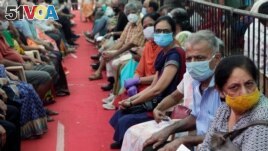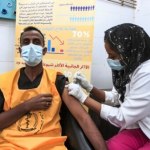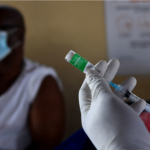India has recorded the world's sharpest increase in coronavirus infections in recent weeks. The crisis has put great pressure on the country's health system, causing hospitals in major cities to run out of beds, oxygen and medicines.
最近几周,印度录得了全球新冠病毒感染最急剧的增长。这场危机给该国的卫生系统带来了巨大压力,导致大城市医院的床位、氧气和药品都耗光了。
Scientists are studying whether a variant of the coronavirus is to blame for the unexpected rise in Indian cases. The variant, named B.1.617, has been reported in at least 17 other nations as well.
科学家们正在研究是否应该将印度病例的意外增长归咎于一种新冠病毒变种。这种命名为B.1.617的新变种至少在其它17个国家也有报告。
Here is what health officials know about this variant so far.
以下是卫生官员截至目前对这种变种的了解。
What is the Indian variant?
何谓印度变种?
Shahid Jameel is a virologist in India. He said the variant contains a mutation in the spike protein, the part of the virus that attaches to human cells. The spike protein is targeted by existing vaccines. The mutation may mean that the vaccines offer less protection against the variant.
沙希德·杰米是印度的病毒学家。他说该变种的刺突蛋白包含一个突变,刺突蛋白是指病毒依附于人体细胞的部分。刺激蛋白是现有疫苗的目标。突变可能意味着疫苗针对这种变体的防护降低。
The World Health Organization (WHO) said the B.1.617 variant was first identified in India last December. An earlier version was seen in October 2020.
世界卫生组织表示,B.1.617于去年12月在印度首次发现。一个更早的变种版本在2020年10月被发现。
The WHO has called the virus version a "variant of interest." That means it may have mutations that make the virus easier to spread, cause more severe disease or escape vaccine immunity. The WHO has called other versions found in the United Kingdom (UK), Brazil and South Africa "variants of concern," suggesting a higher threat level.
世卫组织将这种病毒变种称为“待观察变种。”这意味着它可能包含使病毒更容易传播,引起更严重疾病或逃脱免疫的突变。世卫组织称在英国、巴西和南非发现的其它变种是“须关切变种”,表明威胁级别更高。
Are variants causing the increase in cases?
变种会导致病例增长吗?
The WHO says more study is urgently needed to find out whether the variants are driving the increases. Limited research carried out in laboratories has suggested the variant could be more transmissible.
世卫组织表示迫切需要进行更多研究,以查明这些变种是否会推动病例增长。在实验室进行的有限研究表明,该变种可能更具传播性。
However, health officials say another highly transmissible variant that was first discovered in the UK is behind an increase in cases in some parts in India.
然而卫生官员表示,另一种最初在英国发现的高传播性变种是印度某些地区病例数增长的原因。
Sujeet Kumar Singh is head of India's National Center for Disease Control. He said that in New Delhi, UK variant cases almost doubled during the second half of March. But he said the Indian variant has been widely seen in Maharashtra, the country's hardest-hit state.
苏杰·库玛尔·辛格是印度国家疾病控制中心的负责人。他说,新德里的英国变种病例在3月下半月几乎翻了一番。但他表示,印度变种在该国疫情最严重的马哈拉施特拉邦已经广泛传播。
Chris Murray is a disease expert from the University of Washington in the United States. He said the large amount of cases seen in a short period of time in India means there could be what he called an "escape variant."
克里斯·穆雷是美国华盛顿大学的疾病专家。他说,印度在短时间出现大量病例意味着这里可能出现了他所谓的“逃脱变种。”
Such a variant could be overpowering any past immunity from natural infections in some populations, Murray said. "That makes it most likely that it's B.1.617," he added.
穆雷说,这种变种可能会超越某些人群对自然感染的任何既往免疫力。他还表示:“B.1.617可能就是这种变种。”
But Murray also pointed out that more research is needed, and that the spread is also being driven by the UK and South African variants.
但是穆雷也指出还需要进行更多研究,而且这种传播还受到了英国和南非变种的推动。
Carlo Federico Perno is with Rome's Bambino Gesù Hospital. He said it is very unlikely that the Indian variant is the only cause of India's sharp increase in cases. He pointed to large social gatherings as another possible cause.
卡罗·费德里克·佩尔诺就职于罗马的耶稣儿童医院。他表示印度变种不可能是印度病例数量急剧增长的唯一原因。他指出,大型社交聚会是另一个可能的原因。
Indian Prime Minister Narendra Modi has been criticized for permitting big political gatherings and religious festivals that turned out to be super-spreader events.
印度总理莫迪因允许大型政治聚会和宗教节日而受到批评,这些被证明是是超级传播活动。
Do vaccines help?
疫苗有用吗?
There are some hopeful signs that vaccines may stop the Indian variant. White House chief medical adviser Anthony Fauci said early evidence shows that Covaxin, a vaccine developed in India, is able to effectively fight it.
有迹象表明疫苗有希望阻止印度变种的传播。白宫首席医学顾问安东尼·福奇表示,早期证据表明,印度研制的科瓦辛疫苗能够有效抵抗这种疾病。
In the UK, the government's Public Health England said it was working with international partners to study the B.1.617 variant. It said there is currently no evidence that the Indian variant, nor the British or South African variants, cause more severe disease or make the vaccines less effective.
英国政府公共卫生部门称其正与国际合作伙伴合作研究B.1.617变种。它说,目前没有证据表明印度变种、英国变种或是南非变种会引发更严重的疾病或是使疫苗无效。
I'm Bryan Lynn.
我是布莱恩·林恩。(51VOA.COM原创翻译,请勿转载,违者必究!)













